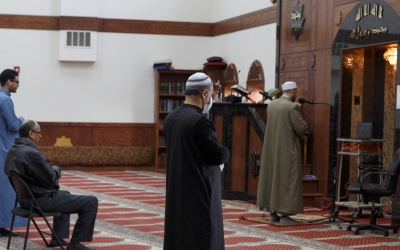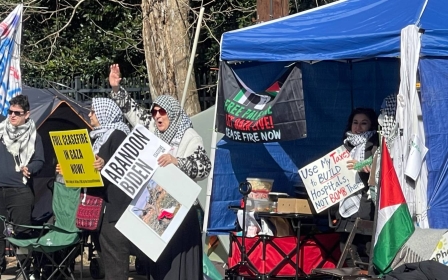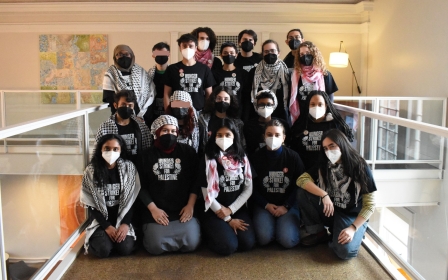New York Times and Wall Street Journal's op-eds provoke social media fury over anti-Arab racism

A string of opinion articles that equated the Middle East to a “jungle” and labelled Dearborn, Michigan, as the “Jihad capital” of America in reference to its Arab and Muslim community has sparked a social media outcry about racism and media bias in the US.
In an article titled, “Seeing the Middle East Through the Animal Kingdom,” New York Times columnist Thomas Friedman described the US’s armed foes Hezbollah, the Houthis and Kataib Hezbollah in insect terms, adding that Washington could not defeat them without “setting fire to the whole jungle”, an apparent reference to the wider Middle East.
"Sometimes I contemplate the Middle East by watching CNN. Other times, I prefer Animal Planet,” he added.
His remarks prompted an outpouring of anger on social media.
"Through the animal kingdom? Friedman, you absolutely ignorant, racist dolt,” Pakistani writer Fatima Bhutto wrote on the social media platform, X.
New MEE newsletter: Jerusalem Dispatch
Sign up to get the latest insights and analysis on Israel-Palestine, alongside Turkey Unpacked and other MEE newsletters
“These are human beings and your failure to recognise this is part of why we are watching your country sanction the genocide of men, women and children over 120 excruciating days.”
“Thomas Friedman comparing countries in the middle east to animals, pests & insects is so virulently racist it could have run in der sturmer or on radio rwanda pre-‘94 genocide,” another wrote on X.
Other social media users asked how Friedman’s article made it past the New York Times editors and noted a double standard in its editorial policy.
“If an Arab American wrote the same article and referred to Israelis or Jewish people as “parasitic wasps” and “spiders” as Friedman said, he would be in jail,” one said.
'Bullhorn for anti-Arab incitement'
Friedman’s piece wasn’t a one-off in the US press. The same day, the Wall Street Journal published an op-ed with the title, "Welcome to Dearborn, America’s Jihad Capital", referring to the most prominent hub for Muslim and Arab Americans in the US.
Dearborn’s mayor, Abdullah Hammoud, slammed the article as “Reckless. Bigoted. Islamophobic.” He said that police were now ramping up their presence to protect members of the community from hate crimes.
Census figures show that 54 percent of Dearborn is Arab American, with immigrants from the Levant, the Gulf, and North Africa.
The majority are Arab Muslims, but there is also a sizeable number of Arab Christians. Dearborn is regularly featured in the media for its rich Middle Eastern culture.
The article author, Steven Stalinsky, claimed that members of Dearborn’s Arab American community “celebrated” Hamas’s 7 October attack on southern Israel, adding that “Local enthusiasm for jihad against Israel and the West extends beyond [the] celebration of Hamas,” alleging that the city was a hub for “terrorism”.
His piece was slammed on social media for inciting Islamophobia and hatred against Arab Americans, particularly at a time when attacks on the community are rising.
“Maybe the time has come for the #Arab #American community in Michigan to sue the #WSJ for allowing its forum to become bullhorn for anti-Arab incitement and islamophobia,” DC-based journalist Said Arikat, wrote on Twitter.
An online petition demanding the WSJ retract Stalinsky’s op-ed and a separate WSJ editorial board op-ed condemning the Chicago City Council’s call for a Gaza ceasefire has garnered 4,991 signatures.
“These articles are alarmist and espouse racist tropes of Arab and Muslim American communities,” the authors wrote.
“These opinion pieces lack any research or references and is based on hearsay and decades of Islamophobic rhetoric. Worse, the articles paint politically and ideologically diverse Arab and Muslim communities with the broad brush of terrorism.”
Discredited examples?
Stalinsky alleged that a number of organisations in Dearborn have provided rhetorical support to armed groups in the Middle East.
He accused the Hadi Institute, which runs an Islamic Montessori school, of commemorating famed Iranian Quds Force commander Qassem Soleimani and former Kataib Hezbollah leader, Abu Mahdi al-Muhandis, both of whom the US assassinated.
But Stalinsky’s picture of an inherently violent Arab American society in Dearborn was created using examples of individuals that are widely discredited among the city’s Arab community, according to previous reporting by Middle East Eye.
In one case, he labelled one man, Ahmad Musa Jibril, “perhaps the most influential English-speaking jihadi sheikh” in Dearborn.
However, MEE previously reported that senior religious figures in Dearborn had disavowed Jibril multiple times.
“For sure, he is not an imam. He is not a clergy,” Mohammad Ali Elahi, imam at the Islamic House of Wisdom in Dearborn, told MEE.
“No one in our community has given any credibility or validation for his being a scholar,” Suehaila Amen, a Dearborn-based Muslim activist and former well-known reality TV figure, added.
“People don’t even know who he is. The leaders in our community have never interacted with him.”
Stalinsky is the executive director of the pro-Israel, Middle East Media Research Institute, a nonprofit think tank that compiles and translates media reports from the region and offers analysis.
The organisation was co-founded by Yigal Carmon, a former Israeli intelligence officer. The institute has been featured in previous WSJ op-eds.
Middle East Eye delivers independent and unrivalled coverage and analysis of the Middle East, North Africa and beyond. To learn more about republishing this content and the associated fees, please fill out this form. More about MEE can be found here.





